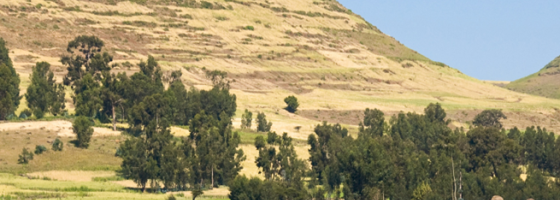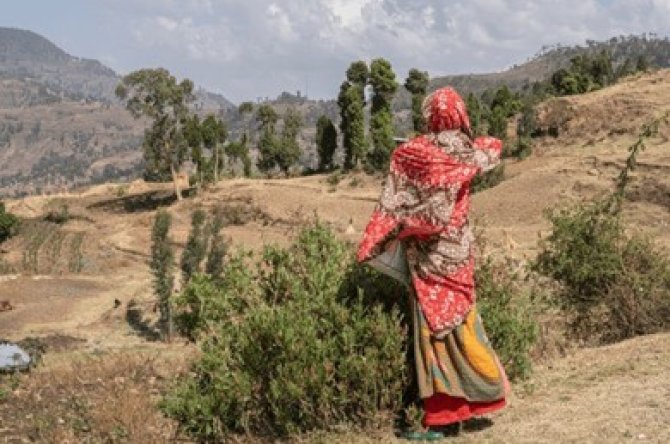Blog post
Bridging knowledge and action
PhD candidate Dereje Yimam tells of his journey to the Global Outstanding Research Award 2024.

During one of my fieldwork days in the Lake Tana sub-basin of Ethiopia, while working on my PhD project on governing SDGs interactions with SDG 15, I met Aster, a woman farmer of a female-headed household whose story I still carry with me. She stood in the middle of her barren field, the soil dry and lifeless. The rains she had once depended on hadn’t come for years. Her voice trembled as she spoke about her fears, not just for her crops, but also for her family and her community.
Aster’s plight reminded me of the stories from the documentary ‘Beyond Borders’, where climate refugees shared how they left everything behind in search of survival. But Aster wasn’t beyond the border, she was still there, holding on. “Imagine,” she said to me, “watching your home, your future, and your hope turn to dust”. Indeed, during all my fieldwork days, I realized that Aster’s story is not unique; it is shared by countless farmers across Ethiopia. Farmers like Aster, who have been working on their land for decades, are facing forces beyond their control. Yet they carry profound knowledge of their land, their skies, their seasons. Imagine the impact we could make if we could connect this Indigenous wisdom with scientific tools to create a stronger, more resilient agricultural system.

This moment inspired me to conduct a miniature research alongside my PhD work, focusing on bridging indigenous knowledge with scientific insights to build resilience. Fortunately, around the same time, I came across a call for for applications by the Global Development Network (GDN) on LinkedIn, which presented the perfect opportunity to pursue this meaningful research. As a result, I applied and was honored to receive the Global Outstanding Research Award (ORD) 2024, presented by the Global Development Network in partnership with the Government of Japan and the World Bank Group. This recognition highlights my work on ‘deconstructing silos, building bridges: A multi-epistemological approach to examining synergies between Indigenous and scientific knowledge for effective climate change adaptation strategies within the Ethiopian Agrarian context’.
Ethiopia is one of the top 10 most climate-vulnerable countries. Average temperatures have risen by 1.3°C since 1960, with a projected increase to 2.3°C by 2075. Current adaptation strategies often ignore local knowledge in favour of top-down scientific methods. There is limited evidence on the integration of Indigenous and scientific adaptation approaches. A disconnect exists between policymakers and community needs.
Key objectives of the miniature research:
- To deconstruct silos: analyse existing divides between indigenous and scientific approaches to climate adaptation.
- To build bridges: co-create effective, context-specific adaptation methods grounded in shared knowledge.
Relevance and Impact:
Informing and influencing climate adaptation policies, agricultural development plans, and environmental conservation programmes. Enhancing the resilience capacity of farmers through the ‘AdaptConnect mobile’ application by providing real-time weather forecasts, seasonal climate predictions, and pest outbreak alerts using data from meteorological agencies. Indigenous communities gain recognition for their knowledge, fostering pride and participation. Farmers receive tailored solutions combining traditional and scientific methods, reducing climate vulnerability.
This award is not just a recognition of past achievements but a motivation to continue contributing to solutions for global challenges. I look forward to collaborating with fellow researchers, policymakers, and development practitioners to maximize the impact of this work.
See also news article on the Global Outstanding Research on Development (ORD) Award 2024.